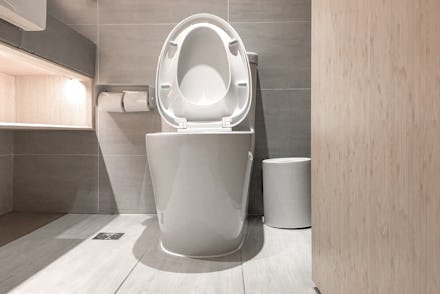Why do I keep waking up to pee at night?

It’s like clockwork: Every night, I get up at least twice, sometimes three or four times, to pee. The anxious thoughts that surface make it hard to doze off after each bathroom trip, leaving me zombie-like the next morning. I’m pretty sure I’d actually get some quality sleep if I didn’t have to pee so damn much. Why do I keep waking up at night to pee, and how do I stop?
To find out, I spoke with Xue Ming, a sleep expert and professor of neurology at the Rutgers New Jersey Medical School. She points to two culprits that could underlie a frequent urge to pee at night, also known as nocturia, if you're feeling fancy.
Ming suggests first asking yourself if you snore or breathe heavily while you sleep. If you do, “there’s a good chance that you’ll wake up to urinate,” she says. These nighttime noises may indicate sleep apnea — when you periodically stop breathing while you’re asleep, according to the Mayo Clinic — or some other sleep breathing problem.
“In the daytime, when you’re awake, your brain is in charge, and you’re breathing a lot more,” Ming tells me. When you’re asleep, your brain is less involved in breathing, so your airway tends to be a little narrower than it is when you’re awake, which is totally fine for most people. But if your airway becomes too tight, or if it has some sort of obstruction — worsened by gravity causing your tongue to slide into your throat, for instance — you might gasp while inhaling in order to draw more air into your lungs.
This suction force also draws more blood into your heart, filling it up and increasing levels of a neurotransmitter called brain natriuretic peptide, or BNP, which causes the excretion of all that excess fluid as urine, Ming says.
If you don't have sleep breathing problems, plain old anxiety might explain why you keep waking up to pee, Ming says. This could mean an anxiety disorder or just a regular, run-of-mill bout of anxiety that accompanies something stressful you're experiencing in your life.
During deep sleep, your brain blocks out sensory inputs, including the fullness in your bladder that makes you want to pee. But if you’re a light sleeper, “the gate that blocks sensory inputs to the brain isn’t fully closed.” As a result, “the signal that your bladder is full will go to your brain.” You tend to pee more at night than a deep sleeper because you feel the urge to do so more frequently.
Avoid beverages that pass through your body pretty quickly at least two hours before bedtime.
According to my partner, I don’t really snore, so I have a hunch it’s my anxiety that’s making me need to pee so much at night. I’ll continue managing it with medication and therapy, in hopes that they’ll help me sleep more deeply. I can also do a better job at going to bed and waking up at the same time every day, including weekends, and resisting the urge to doom scroll a few hours before I go to bed, as Ramiz Fargo, a sleep medicine specialist at Loma Linda University Health, suggested in a story I wrote for Mic about how light sleepers can catch enough Zs.
If you suspect you have sleep apnea, Ming suggests reaching out to a sleep medicine specialist, who can provide a clinical diagnosis. And if you already know you have sleep apnea, sleep with you head elevated, perhaps on a wedge pillow, to minimize airway obstruction.
Finally, Ming suggests avoiding beverages that pass through your body pretty quickly at least two hours before bedtime. That includes water, tea, and pretty much any thin liquids. Before chatting with Ming, I hadn’t realized I needed to cut off my hydration so early.
I’ll try some of these strategies and cross my fingers that they’ll work. At least I find comfort in knowing that I can do something about needing to pee so often at night, and that it doesn’t have to ruin my sleep forever.